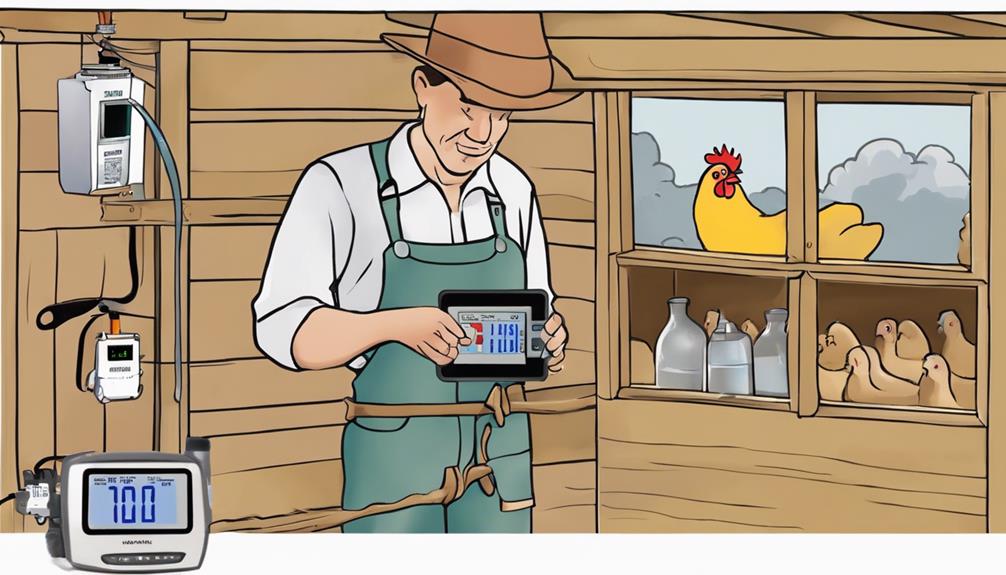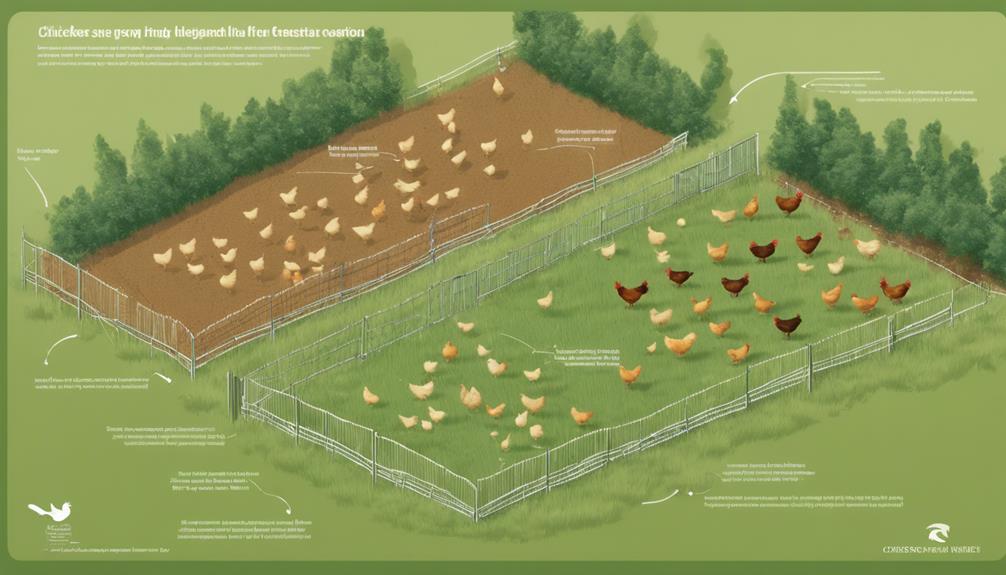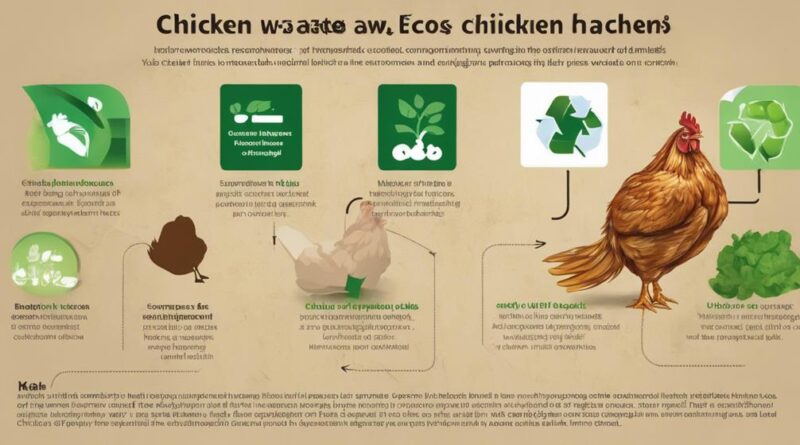10 Tips to Mitigate Chicken Waste Environmental Impact"
To reduce chicken waste's environmental impact, prioritize proper waste management practices. Opt for composting to enrich soil and control odors. Implement a deep litter system for organic material creation and pathogen control. Set up a robust manure management plan for nutrient recycling. Ensure efficient ventilation systems and monitor air quality. Use sustainable bedding materials and monitor ammonia levels closely. Utilize waste as organic fertilizer and employ rotational grazing. Invest in innovative waste treatment technologies to lower ecological footprint. These tips offer practical solutions for sustainable poultry farming practices.
Implementing Proper Waste Management Practices
To effectively reduce the environmental impact of chicken waste, prioritize the implementation of streamlined waste management practices. Waste reduction strategies play a crucial role in minimizing the ecological footprint of poultry farming operations. Conducting a comprehensive environmental impact assessment can provide valuable insights into the areas that require immediate attention. By identifying key sources of pollution and inefficiencies, you can tailor waste management strategies to address these specific issues effectively.
Ensuring regulatory compliance is essential when implementing waste management practices. Adhering to local, state, and federal guidelines not only helps in avoiding potential fines but also contributes to a more sustainable approach to chicken waste management. Sustainable practices such as proper storage, handling, and disposal methods can significantly reduce the negative impact of poultry farming on the environment.
Implementing efficient waste management practices not only benefits the environment but also has economic advantages. By reducing waste generation and optimizing resource utilization, poultry farmers can lower operational costs and improve overall efficiency. Investing in technologies that facilitate waste segregation, recycling, and treatment can further enhance the sustainability of chicken farming operations.
Utilizing Composting Techniques
Prioritize the implementation of composting techniques as a sustainable solution to effectively manage chicken waste and reduce environmental impact. Composting chicken waste involves the decomposition of organic materials, resulting in a nutrient-rich soil amendment that benefits agricultural practices. This method not only helps in waste reduction but also contributes to soil enrichment.
Composting plays a crucial role in enhancing soil quality by adding essential nutrients like nitrogen, phosphorus, and potassium back into the soil. These nutrients are vital for plant growth and can improve crop yields. Additionally, compost helps in retaining soil moisture, promoting better soil structure, and reducing erosion. By incorporating composted chicken waste into the soil, you can create a healthier and more productive environment for plants to thrive.
Furthermore, composting effectively addresses the issue of odor control associated with chicken waste. The process of composting helps in breaking down organic matter, reducing foul odors that can be a nuisance to surrounding areas. Proper management of compost piles, including regular turning and moisture control, can minimize odor emissions significantly.
Incorporating Deep Litter System
Implementing the deep litter system offers a sustainable approach to managing chicken waste efficiently, reducing environmental impact, and promoting soil health. This method involves allowing bedding materials such as straw, wood shavings, or sawdust to accumulate inside the chicken coop. As the chickens scratch and peck at the litter, their droppings get mixed in, kickstarting the decomposition process. The deep litter system is effective in enhancing litter management by providing a natural way to break down waste materials.
One of the key benefits of the deep litter system is waste reduction. By utilizing this method, you can significantly decrease the amount of waste that would otherwise need to be removed and disposed of. The continuous decomposition of the litter creates a rich organic material that can be used to fertilize gardens or crop fields, thus closing the loop on waste management. Additionally, the composting process helps to kill harmful pathogens present in the chicken waste, leading to a healthier environment for both the chickens and the soil.
Incorporating the deep litter system into your chicken coop not only simplifies litter management but also contributes to sustainable waste reduction practices. By allowing nature to take its course within the coop, you can transform chicken waste into a valuable resource for enhancing soil fertility and plant growth.
Establishing Manure Management Plan
How can effective manure management strategies enhance the sustainability of your chicken farming operation?
Establishing a robust manure management plan is crucial for maximizing nutrient recycling and preventing pollution on your farm. By effectively managing chicken waste, you not only reduce environmental impact but also improve the overall efficiency of your operation.
Nutrient recycling is a key aspect of manure management. Chicken manure is rich in nutrients like nitrogen and phosphorus, which are valuable for soil health and crop production. Implementing practices such as composting or utilizing manure as fertilizer allows you to recycle these nutrients back into the soil, reducing the need for synthetic fertilizers and closing the nutrient loop on your farm.
Pollution prevention is another critical element of a manure management plan. Improperly managed chicken waste can leach harmful substances into water bodies, leading to water pollution. By implementing strategies like proper storage, timely removal, and appropriate application of manure, you can prevent nutrient runoff and contamination of water sources, safeguarding the environment and complying with regulations.
Installing High-Quality Ventilation Systems
To optimize the health and productivity of your chicken flock, ensuring the installation of high-quality ventilation systems is imperative. Ventilation efficiency plays a crucial role in maintaining a conducive environment within poultry houses. Proper ventilation helps regulate temperature, remove excess moisture, and minimize the concentration of harmful gases such as ammonia and carbon dioxide. Investing in well-designed ventilation systems can significantly improve air quality, which is essential for the overall well-being of your chickens.
One key aspect to consider when installing ventilation systems is air quality monitoring. By regularly monitoring the air quality inside the poultry house, you can ensure that the ventilation system is functioning effectively. Implementing sensors to measure key air quality indicators like ammonia levels and humidity can help you adjust ventilation settings as needed to maintain optimal conditions for your chickens.
Incorporating technologies such as automated ventilation controls can enhance the efficiency of the system further. These controls can adjust ventilation rates based on real-time data, ensuring that your chickens always have access to fresh, clean air. Additionally, proper maintenance and regular inspections of the ventilation system are essential to guarantee its long-term performance. By prioritizing ventilation efficiency and proactive air quality monitoring, you can create a healthier and more productive environment for your chicken flock.
Adopting Sustainable Bedding Materials
Consider incorporating sustainable bedding materials to reduce environmental impact and improve overall poultry house sustainability. Choosing the right bedding material is crucial for maintaining a healthy environment for your chickens while also minimizing the ecological footprint of your operations. Here are four key points to consider:
- Bedding alternatives: Opt for sustainable bedding options such as straw, wood shavings, or recycled paper products. These materials are biodegradable, renewable, and environmentally friendly compared to traditional options like sand or gravel.
- Environmental benefits: Sustainable bedding materials offer a range of environmental benefits. They help absorb moisture effectively, control odors, and provide a comfortable living environment for the chickens. Additionally, these materials can be composted after use, reducing waste sent to landfills.
- Cost-effectiveness: While sustainable bedding materials may have a slightly higher upfront cost, they often prove to be more cost-effective in the long run. Their superior absorption qualities can lead to reduced bedding usage and lower overall expenses.
- Healthier chickens: By choosing bedding materials that are free from harmful chemicals and contaminants, you can promote the health and well-being of your flock. Sustainable options are less likely to cause respiratory issues or skin irritations in chickens, leading to happier and healthier birds.
Monitoring Ammonia Levels Regularly

To ensure optimal poultry house sustainability and minimize environmental impact, consistently monitor ammonia levels in the chicken waste management process. Ammonia testing is crucial in evaluating the effectiveness of waste management practices and their impact on the environment. High levels of ammonia in chicken waste can lead to various environmental issues, including soil and water contamination, as well as negative effects on the health of both animals and workers.
Regular monitoring of ammonia levels allows for early detection of potential problems, enabling prompt adjustments to the waste management system. By implementing routine testing protocols, you can track the levels of ammonia in the poultry house and take proactive measures to mitigate any harmful effects. This data-driven approach provides valuable insights into the efficiency of waste management strategies and helps in making informed decisions to reduce environmental impact.
Maintaining optimal levels of ammonia in chicken waste is essential for sustainable poultry farming practices. By monitoring and controlling ammonia levels, you can create a healthier environment for the chickens, minimize the risk of environmental pollution, and enhance the overall sustainability of your operation. Investing in ammonia testing equipment and incorporating regular monitoring into your waste management routine is a proactive step towards mitigating the environmental impact of chicken waste.
Utilizing Waste as Organic Fertilizer
Regularly incorporating chicken waste as organic fertilizer in your farming practices can significantly enhance soil health and promote sustainable agricultural operations. By utilizing chicken waste in this manner, you not only reduce waste but also provide numerous benefits to your soil and crops.
Here are four key advantages of using chicken waste as organic fertilizer:
- Soil Enrichment: Chicken waste is rich in essential nutrients like nitrogen, phosphorus, and potassium, which are vital for plant growth. When applied to the soil, these nutrients improve soil structure and fertility, promoting healthier plant development.
- Increased Crop Yields: The nutrients present in chicken waste help boost crop yields by providing plants with the elements necessary for optimal growth. This can lead to larger harvests and better quality produce.
- Cost-Effective Solution: Using chicken waste as organic fertilizer can reduce the need for synthetic fertilizers, cutting down on costs associated with purchasing commercial products. It's a sustainable and cost-effective way to nourish your soil.
- Environmental Sustainability: By recycling chicken waste as fertilizer, you contribute to environmental sustainability by reducing waste and minimizing the environmental impact of traditional waste disposal methods. This eco-friendly approach aligns with sustainable farming practices and promotes a healthier ecosystem.
Incorporating chicken waste as organic fertilizer can be a valuable practice for enhancing soil health, increasing crop yields, and fostering sustainable agricultural practices.
Implementing Rotational Grazing Practices

Implementing rotational grazing practices enhances soil health, optimizes pasture utilization, and promotes sustainable livestock management. Grazing rotation involves dividing pastures into smaller sections and rotating the chicken flocks through these areas periodically. This method allows for vegetation recovery in previously grazed areas, reducing soil erosion, improving nutrient distribution, and enhancing biodiversity.
Studies have shown that rotational grazing can significantly increase soil organic matter content, which leads to improved soil structure, water retention, and nutrient cycling. Sustainable practices like grazing rotation also help mitigate the environmental impact of chicken waste by spreading it more evenly across the pasture. As chickens graze, they deposit nutrients onto the soil, which can benefit the vegetation and reduce the need for synthetic fertilizers.
Furthermore, rotational grazing can increase pasture productivity as it prevents overgrazing and allows for better regrowth of forage plants. This practice not only benefits the soil and vegetation but also positively impacts the overall health and well-being of the chicken flock. By implementing grazing rotation, you can actively contribute to a more environmentally friendly and sustainable approach to chicken farming while maintaining and even improving the productivity of your pastures.
Investing in Innovative Waste Treatment Technologies
Investing in innovative waste treatment technologies can revolutionize the management of chicken waste, significantly reducing its environmental impact while enhancing sustainability in poultry farming practices. These advanced solutions offer efficient ways to handle waste, turning what was once a problem into a valuable resource.
- Biogas Production: Implementing biogas digesters on poultry farms can help convert chicken waste into biogas energy. This not only reduces the environmental impact of waste but also provides a renewable energy source for the farm.
- Nutrient Recovery: Technologies like nutrient recovery systems can extract valuable nutrients from chicken waste, such as nitrogen and phosphorus, turning them into fertilizers. This process not only minimizes waste but also reduces the need for synthetic fertilizers, promoting environmental sustainability.
- Water Recycling: Advanced treatment technologies can help recycle water used in waste management processes. By reusing treated water for irrigation or other farm activities, poultry farms can reduce water consumption and minimize their environmental footprint.
- Heat Recovery Systems: Waste treatment technologies that incorporate heat recovery systems can utilize the energy generated during waste processing. This recovered heat can be used to warm farm facilities or as an alternative energy source, further enhancing sustainability practices.
Frequently Asked Questions
Can Chicken Waste Be Used to Generate Renewable Energy?
Yes, chicken waste can be utilized to generate renewable energy through waste to energy technology. This process involves converting organic waste into biogas or biofuels, which can serve as renewable fuel sources.
By harnessing the energy potential of chicken waste, you can reduce environmental impact, promote sustainability, and create a valuable energy resource.
Consider exploring this eco-friendly solution to address energy needs while minimizing waste.
How Can Chicken Waste Management Impact Local Water Sources?
When it comes to chicken waste management, your decisions directly affect local water sources. Improper handling can lead to water contamination, harming ecosystems and communities.
By prioritizing environmental sustainability in waste management practices, you can mitigate these risks. Implementing efficient waste treatment systems and monitoring water quality are crucial steps.
Striking a balance between poultry production and protecting water sources is key to fostering a healthy environment for all.
Are There Regulations Regarding Chicken Waste Disposal?
When it comes to regulations compliance for chicken waste disposal, it's crucial to adhere to local, state, and federal guidelines. Implementing appropriate waste treatment technologies can help ensure compliance and minimize environmental impact.
What Are the Potential Risks of Improper Chicken Waste Management?
Improper chicken waste management poses significant risks to the environment. Environmental pollution can result from the release of harmful chemicals and pathogens into water sources.
Soil contamination may occur when excessive waste isn't properly treated, affecting agricultural productivity. Mitigating these risks through responsible disposal methods and regulatory compliance is crucial to safeguarding ecosystems and public health.
Implementing effective waste management practices can help prevent these detrimental impacts.
Can Excessive Ammonia Levels From Chicken Waste Harm Human Health?
Excessive ammonia levels from chicken waste can indeed harm human health. Health risks associated with ammonia exposure include respiratory issues, eye irritation, and potential long-term damage to the respiratory system.
It's crucial to be aware of these dangers and take necessary precautions to mitigate them. Proper ventilation systems and appropriate handling of chicken waste can help minimize the health risks posed by high ammonia levels.
Conclusion
In conclusion, implementing proper waste management practices, utilizing composting techniques, and investing in innovative waste treatment technologies are key steps to mitigate the environmental impact of chicken waste.
By incorporating these solutions, farmers can reduce harmful emissions, improve soil health, and promote sustainable agricultural practices.
It's crucial for the poultry industry to prioritize environmentally-friendly practices to address the challenges posed by chicken waste and work towards a more sustainable future.
